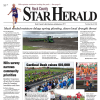There may finally be a good excuse for carrying around extra weight. As it turns out, by donating our waist products (as opposed to waste products) we may possibly advance medical science and benefit most of mankind. Scientists from the International Fat Applied Technology Society, a real group according to several news sources, met recently in Pittsburgh to discuss an exciting possibility — fat might be a good source of stem cells. Although human studies of the cells might not begin for another five years, hopes are high that fat-derived stem cells will treat a wide variety of serious health problems. The president of the society notes that the group "is trying to make fat do good." That’s a noble mission and it will change the way we identify medical donors on the street. Until now, the only accurate way to determine whether or not a complete stranger was a medical donor was to push him into an alley, knock him down, take his wallet and read his driver’s license. We have been much too polite to ask directly. That system, although seriously flawed, will soon change when six out of every 10 Americans, the number that’s classified as overweight, will look like potential donors. Sharing one’s fat through liposuction in order to make this world a better place would be somewhat similar to donating blood or having long tresses lopped off so that wigs can be made for less fortunate, hairless people in third world countries. In all three cases — fat, blood and hair — with a healthy diet and a robust appetite, those donated items will grow back quickly. The same can’t be said for donors who decide to give up organs they already have two of, such as lungs or kidneys. Their sacrifices are great, but with luck they will still to able to rely upon spare duplicate parts for their own survival. (That’s not true of one man I heard about in the early 60s, who donated a kidney to his brother at a university hospital. Unfortunately, mistakes had been made and his donated kidney was his only one.) What would really be heroic, and extremely foolish, would be donating a body part you only have one of, such as a heart, brain or complete liver, while you’re still alive and healthy. A surplus fat donation program might be the only instance when people will stand in line to give with everything they have. In fact, they might be willing to pay to donate. It would be a win-win situation. Donors would lose measurable inches of fat from their bodies and medical researchers would be able to work with and live off the fat of the land. Researchers would talk with pride about their largest contributors. The term "fat cats" would take on a new meaning. Instead of being held in disdain for the extra weight they carry around, donors of surplus fat would be revered as heroes. "The Wind Beneath My Wings," a popular song about personal heroes, could be rewritten as "The Fat Beneath My Wings." Singers with extended vocabularies would sing about "The Adipose Tissue Beneath My Wings." There’s better than a fat chance that we will eventually see wordy, super-sized T-shirts on the streets reading, "I’m proud to be a fat-derived stem cell donor." Unfortunately for underweight people, the shirts won’t be available in their smaller sizes.


